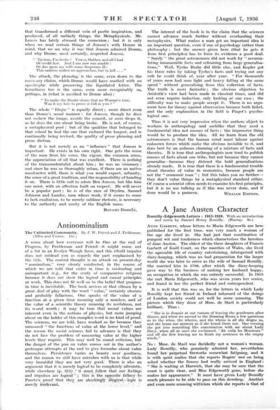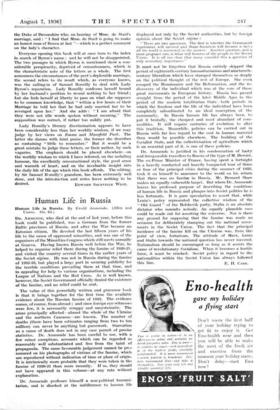A Jane Austen Character
Romilly-Edgeworth Letters : 1813-1818. With an introduction. and notes by Samuel Henry Romilly. (Murray. 9s.) ANNE GARBErr, whose letters to Maria Edgeworth are here .
published for the first time, was very much a woman of the age she lived in. She had just that combination of pungent wit and tenderness which characterises the heroines of Jane Austen. The eldest of the three daughters of Francis Garbett of Knill Court, on the marches of Wales, she lived the agreeable life of country entertaining, interspersed with diary-keeping, which was no bad preparation for the larger world she was later to enter as the wife of Samuel Romilly-. She married him in 1798, after which the diary-keeping gave way to the business of making her husband happy, an occupation in which she was entirely successful. In 1813 she met Maria Edgeworth, who was seven years her senior, and found in her the perfect friend and correspondent.
It is well that this was so, for the letters in which Lady Romilly kept her friend in Ireland informed of the doings of London society could not well be more amusing. The picture which they draw of Mme. de. Stag is particularly brilliant. Thus :
" She is in despair at our custom of leaving the gentlemen after dinner, and when we ascend to the Drawing Room a few questions as to the whoa, the wheres, and the whens is all she deigns us, and she hears our answers as if she heard them not. One evening she got into something like conversation with me about 'Lady Davy, when all it once she exclaimed, Ah voila les Messieurs" and off she flew leaving me to finish my sentence to the empty winds."
No : Mme. de Stael was decidedly not a woman's woman. Lady 'Romilly, who genuinely admired her, nevertheless
found- her' perpetual fireworks somewhat fatiguing, and it is with quiet malice that she reports Rogers' mot on being asked whether the lioness had really arrived in England-: " She is waiting at Harwich; that she may be sure that the
coast is quite clear, and• Miss Edgeworth gone; before she makes her appearance." It must have given Lady Romilly much pleasure to be able to pass on this dewdrop. Another and even more amusing witticism which she reports is that of the Duke of Devonshire who, on hearing of Mme. de Steel's marriage, said : " I find that Mine. de Steel is going to make an honest man of Rocca at last "—which is a perfect comment on the lady's character.
Everyone opening this book will at once turn to the index in search of Byron's name ; and he will not be disappointed. The two passages in which Byron is mentioned show a con- siderable perspicacity, deprived of censoriousness, which is the characteristic note of the letters as a whole. The first announces the circumstances of the poet's deplorable marriage, the second refers to its result which, as everyone knows, was the calling-in of Samuel Romilly to deal with Lady Byron's separation. Lady Romilly confesses herself bound by her husband's position to reveal nothing to her friend ; but she feels herself at liberty to pass on what she supposes to be common knowledge, that " within a few hours of their Marriage he told her that he had only married her to be revenged upon her." And she adds : " I am afraid that they were not idle words spoken without meaning." The supposition was correct, if rather too mildly put.
Lady Romily's literary discrimination appears to have been considerably less than her worldly wisdom, if we may judge by her views on Emma and Mansfield Park. The latter she damns with faint praise, the former she describes as containing " little to remember." But it would be a great mistake to judge these letters, or their author, by such vagaries. The emphasis should be placed elsewhere—on the worldly wisdom to which I have referred, on the unfailing humour, the-excellently conversational style, the good sense and warmth of heart, and on the invaluable insight into the daily life of the age which this book affords. The editing, by Sir Samuel Rlmilly's grandson, has been extremely well done, and the introduction and notes leave nothing to be







































 Previous page
Previous page